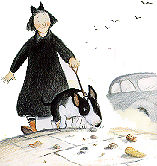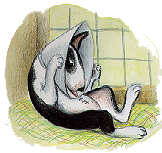


|
Rosa Moves to Town.
Barbro Lindgren. Illustrated by Eva Eriksson.
Subject Heading:
Preschool - grade 2 / Ages 4 - 7. *** /4
|

excerpt:
After Lisa rushed home to her make-believe baby, a very old dog, Tessie, strolled by. She was so old that she was blind, but by smelling she could tell that Rosa was friendly. She sniffed until she got tired and had to leave. Rosa was bored. But not for long. As she lay down trying to sleep, a brown rocket leaped over her. It was Bomber. Even thought he was fast, Rosa wrestled him to the ground and sat on him. Even more exciting was a sudden stream of babies in strollers. The first baby that she licked howled. Luckily the next one wanted a kiss. Rosa licked and licked it until its owner ran off with it.
 The internationally acclaimed author-illustrator team from Sweden have
followed up Rosa, Perpetual Motion Machine with a new book about Rosa, an
endearing but willful Bull Terrier. Rosa Moves to Town describes how, from a
dog's viewpoint, Rosa and her aunt encounter the pros and cons of urban life.
Rosa delights in tasting the tempting litter lying about the sidewalks and
observing the (mostly) friendly dogs and babies parading by. At home,
having too vigorously chewed on favourite dog toys, Rosa must be rushed
to pet hospital to have toy parts removed from her stomach. As Rosa leaves
the hospital, she again spies a sidewalk delight and is only just prevented
from ingesting it by her watchful aunt.
The internationally acclaimed author-illustrator team from Sweden have
followed up Rosa, Perpetual Motion Machine with a new book about Rosa, an
endearing but willful Bull Terrier. Rosa Moves to Town describes how, from a
dog's viewpoint, Rosa and her aunt encounter the pros and cons of urban life.
Rosa delights in tasting the tempting litter lying about the sidewalks and
observing the (mostly) friendly dogs and babies parading by. At home,
having too vigorously chewed on favourite dog toys, Rosa must be rushed
to pet hospital to have toy parts removed from her stomach. As Rosa leaves
the hospital, she again spies a sidewalk delight and is only just prevented
from ingesting it by her watchful aunt.

While the story uses simple, understated language, it is the pictures that captivate. With a few effective strokes, Eriksson has created wonderfully expressive characters in pastels. Both Lindgren and Eriksson obviously understand the canine temperament and portray it with much humour and affection. Children will relate to the honesty of emotions that Rosa, as a dog, is free to convey. They will also appreciate, at a deeper level, the unconditional love displayed by the patient aunt for the recalcitrant child that is Rosa.
My only quibble with this engaging book is its anticlimactic ending. As previously mentioned, Rosa barely avoids another trip to the hospital when her aunt stops her from chewing on a discarded pacifier. Perhaps something may be lost in the translation, but, if the book's last sentence aims for humour, it misses the mark. Nonetheless, this book will be enjoyed by children and dog-lovers of all ages.
Recommended.
Alison Mews is Coordinator at the Centre for Instructional Services in the Faculty of Education at Memorial University of Newfoundland.

To comment on this title or this review, send mail to cm@umanitoba.ca.
Copyright © 1997 the Manitoba Library Association. Reproduction for personal use is permitted only if this copyright notice is maintained. Any other reproduction is prohibited without permission.
Published by
The Manitoba Library Association
ISSN 1201-9364
TABLE OF CONTENTS FOR THIS ISSUE - APRIL 25, 1997.
AUTHORS | TITLES | MEDIA REVIEWS | BOOKSHELF | BACK ISSUES | SEARCH | HOME